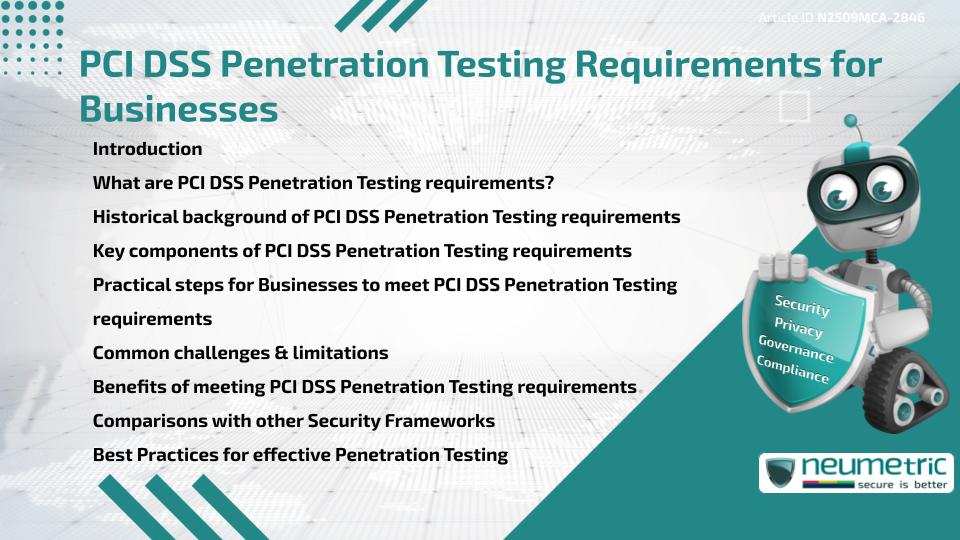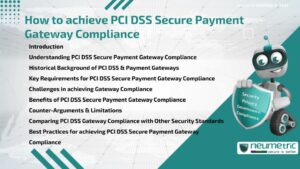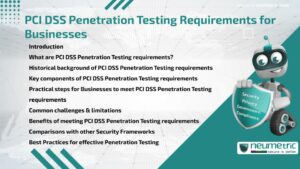Table of Contents
ToggleIntroduction
The PCI DSS Penetration Testing requirements are a critical part of maintaining secure Payment Systems & protecting sensitive Cardholder Data. These requirements help Businesses identify Vulnerabilities, evaluate the effectiveness of their Security Measures & reduce the Risk of Data Breaches. Organisations of all sizes that handle Payment Card information must comply with these Standards. By performing Penetration Tests, Companies can uncover weaknesses in Networks, Applications & Processes before Malicious Actors exploit them. This article explains what PCI DSS Penetration Testing requirements involve, their historical background, essential components & best practices for Businesses.
What are PCI DSS Penetration Testing requirements?
The Payment Card Industry Data Security Standard [PCI DSS] defines Penetration Testing as a controlled & authorised attempt to exploit Vulnerabilities in a System. The PCI DSS Penetration Testing requirements focus on testing both Internal & External Networks, as well as Web Applications that process or store Payment Data. Businesses must conduct these tests at least once a year & after any significant changes in their systems, such as upgrades or new deployments.
Historical background of PCI DSS Penetration Testing requirements
The concept of Penetration Testing dates back to the early 1990s, when Businesses began simulating Cyberattacks to understand their defenses. When PCI DSS was first introduced in 2004, Penetration Testing quickly became part of its Framework. Over the years, the PCI DSS Penetration Testing requirements have evolved to address emerging Threats, sophisticated Hacking Techniques & the growing complexity of Payment Environments.
Key components of PCI DSS Penetration Testing requirements
The PCI DSS Penetration Testing requirements include:
- External Penetration Testing: Simulating an Attack from outside the Company’s Network to uncover potential entry points.
- Internal Penetration Testing: Testing within the Company Network to identify Risks from insider Threats or compromised accounts.
- Web Application Testing: Evaluating E-Commerce Platforms, Payment Gateways & related Applications for Coding flaws.
- Network Segmentation Testing: Ensuring that Systems containing Cardholder Data are properly isolated from other parts of the Network.
- Regular Frequency: Annual testing & Re-testing after system changes are mandatory.
Practical steps for Businesses to meet PCI DSS Penetration Testing requirements
To comply with PCI DSS Penetration Testing requirements, Businesses can follow a structured approach:
- Define the Scope: Identify all Systems, Networks & Applications that process Cardholder Data.
- Hire Qualified Professionals: Engage certified Penetration Testers with relevant experience.
- Use both Manual & Automated Tools: Automated Scans combined with manual analysis provide deeper insights.
- Document Findings: Create detailed reports of Vulnerabilities, Risks & Corrective Actions.
- Remediate & Re-test: Address identified issues & perform follow-up tests to verify fixes.
Common challenges & limitations
Meeting the PCI DSS Penetration Testing requirements can be difficult for some Businesses. Cost constraints, lack of In-house Expertise & complex System Environments often slow down Compliance. Another limitation is that Penetration Testing provides a snapshot of security at a given time, meaning new Vulnerabilities can still emerge after Testing.
Benefits of meeting PCI DSS Penetration Testing requirements
Despite the challenges, Businesses gain several benefits:
- Strengthened defense against Cyberattacks
- Greater Trust from Customers & Partners
- Reduced Likelihood of costly Data Breaches
- Enhanced Compliance with Global Regulations
- Competitive advantage in the Marketplace
Comparisons with other Security Frameworks
Unlike general Security Frameworks such as ISO 27001 or NIST, PCI DSS Penetration Testing requirements are specifically designed for Payment Systems. While Frameworks like ISO 27001 cover broad Organisational Security, PCI DSS focuses on Cardholder Data & Payment Systems, making Penetration Testing more targeted & mandatory.
Best Practices for effective Penetration Testing
Businesses should follow Best Practices to maximise the value of Penetration Testing:
- Schedule Tests during non-peak Business hours to reduce disruption.
- Ensure Testers are independent from the Teams managing the Systems.
- Combine Penetration Testing with Vulnerability Scanning for comprehensive coverage.
- Train staff to understand findings & implement corrective measures quickly.
- Regularly review & update Security Policies in line with PCI DSS Penetration Testing requirements.
Conclusion
The PCI DSS Penetration Testing requirements are essential for any Business that processes, stores or transmits Payment Card Data. By following the outlined steps & understanding the challenges, Businesses can maintain Compliance, safeguard Sensitive Data & build long-term Trust with Customers.
Takeaways
- Penetration Testing is a mandatory part of PCI DSS Compliance.
- Both Internal & External Systems must be tested.
- Businesses must Test annually & after major System Changes.
- Independent Professionals should conduct Penetration Testing.
- Remediation & follow-up testing are critical for Compliance.
FAQ
What is the main purpose of PCI DSS Penetration Testing requirements?
The purpose is to identify Vulnerabilities in Payment Systems & reduce the Risk of unauthorised access to Cardholder Data.
How often should Businesses perform Penetration Testing?
Businesses must perform Penetration Testing at least once a year & after any major changes to Systems or Networks.
Who can conduct PCI DSS Penetration Testing requirements?
Only Qualified & Independent Penetration Testers with the required skills & Certifications should perform these tests.
What is the difference between Vulnerability Scanning & Penetration Testing?
Vulnerability scanning identifies possible weaknesses automatically, while Penetration Testing attempts to actively exploit them to assess actual Risks.
Do Small Businesses need to meet PCI DSS Penetration Testing requirements?
Yes, all Businesses that handle Payment Card data, regardless of size, must comply with PCI DSS Standards.
What happens if a Business fails to comply with PCI DSS Penetration Testing requirements?
Non-Compliance may result in Fines, loss of Card Processing Privileges & Reputational damage.
Are PCI DSS Penetration Testing requirements different from general IT Security Standards?
Yes, PCI DSS requirements are specifically focused on protecting Cardholder Data, whereas general IT Standards cover broader Security Practices.
Need help for Security, Privacy, Governance & VAPT?
Neumetric provides organisations the necessary help to achieve their Cybersecurity, Compliance, Governance, Privacy, Certifications & Pentesting needs.
Organisations & Businesses, specifically those which provide SaaS & AI Solutions in the Fintech, BFSI & other regulated sectors, usually need a Cybersecurity Partner for meeting & maintaining the ongoing Security & Privacy needs & requirements of their Enterprise Clients & Privacy conscious Customers.
SOC 2, ISO 27001, ISO 42001, NIST, HIPAA, HECVAT, EU GDPR are some of the Frameworks that are served by Fusion – a SaaS, multimodular, multitenant, centralised, automated, Cybersecurity & Compliance Management system.
Neumetric also provides Expert Services for technical security which covers VAPT for Web Applications, APIs, iOS & Android Mobile Apps, Security Testing for AWS & other Cloud Environments & Cloud Infrastructure & other similar scopes.
Reach out to us by Email or filling out the Contact Form…





